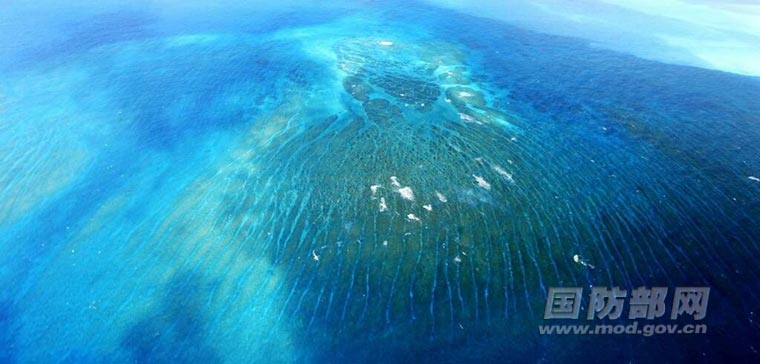


File photo: South China Sea
For some time, China-Philippines ties were greatly harmed by the South China Sea arbitration unilaterally requested by the Aquino III administration in 2013. The arbitration not only breached the international law, but also the consensus between both sides.
As neighbors that cannot be moved, China and the Philippines urgently need to improve their ties since a sound and stable bilateral relationship is in the common interests of both peoples.
Though hindered by recent disputes, China and the Philippines once enjoyed a time-honored friendship. The two countries started trading with each other early in Tang and Song dynasties of over 1,000 years ago. The Chinese fleet visited the Philippines several times in Ming Dynasty.
About 600 years ago, the Sulu leader Paduka Pahala of the Philippines traveled thousands of miles to visit China and later died here. Up to now his descendants are still living in China.
The lineage of Philippine national hero José Rizal could be traced back to Fujian Province in China through his father's ancestor Lam-Co, a Chinese merchant who immigrated to the Philippines in the late 17th century. Ye Fei, the famous Chinese general in the Chinese People’s War of Resistance against Japanese Aggression, was born in Quezon, the Philippines.
After China and the Philippines established diplomatic ties in 1975, they generally maintained a smooth relationship. With frequent high-level exchanges, the two governments have set up mechanisms for multi-layered communication and cooperation.
The two states also reached significant consensus to resolve the South China Sea issue through bilateral negotiation and consultation. In August 1995, China and the Philippines issued a joint statement in which they agreed that "disputes shall be settled by the countries directly concerned" and that "a gradual and progressive process of cooperation shall be adopted with a view to eventually negotiating a settlement of the bilateral disputes."
Five years later, the two sides agreed in another joint statement to promote a peaceful settlement of disputes through bilateral friendly consultations and negotiations in accordance with universally-recognized principles of international law, including the 1982 United Nations Convention on the Law of the Sea (UNCLOS).
The heads of state of the two countries also reaffirmed their desire to resolve disputes through peaceful dialogue in 2011.
China-Philippines relations could have had a prosperous development if these consensuses were implemented. However, the Philippines gradually turned a colder face against China after Aquino III and Albert del Rosario assumed office in 2010 and 2011 respectively as the President and Foreign Minister of the country.
In April 2012, a Philippine naval vessel harassed Chinese fishermen in the waters of Huangyan Island. A year later, the Philippines unilaterally filed the arbitration. It also tried to infringe on China's sovereignty in the Ren'ai Reef in 2013 and 2014 by consolidating its illegally “grounded warship.”
In just a few years, China-Philippines relations have taken a downturn. Predecessors’ contributions to the bilateral friendship have almost been forgotten in face of difficulties, disheartening those who value China-Philippines relations.
The misjudgment of the Aquino III administration regarding the South China Sea issue remain the fundamental reason for this sinking relationship. Stirring up the situation and fishing in muddy waters, the Philippines has been trying to gain private benefits.
Harmony is most precious. Such a traditional value has been long upheld by the Chinese people. Even confronted with the complex situation and vicious provocation, China is still willing to solve the issue through peaceful dialogue and communication, which is the best option.
China-Philippines relations can only return to the track of healthy development if both sides go back to the consensus, stick to negotiations and consultations, implement the Declaration on the Conduct of Parties in the South China Sea in an effective and comprehensive manner and truly ease and manage the maritime tension. China has always been working toward this goal and all people in the region have witnessed that.
President Rodrigo Duterte and the new Philippine government have taken on a positive attitude towards the improvement of bilateral ties. It is expected that the new leadership can demonstrate political wisdom, focus on the common interests of both countries and peoples and make the right decision concerning the future of China-Philippines relations and the wellbeing of both peoples.
The South China Sea arbitration case is nothing more than a political farce. Returning to the table of negotiation and consultation is the correct way to settle disputes and the responsible thing to do for the sake of the long-term development of bilateral relations and the welfare of the two peoples.
Day|Week

 Who Will Fit The Chinese Roles In Game Of Thrones?
Who Will Fit The Chinese Roles In Game Of Thrones? China's Hubei Shennongjia added to World Heritage List
China's Hubei Shennongjia added to World Heritage List Cute Dog At Fruit Stand Becomes Latest Internet Sensation
Cute Dog At Fruit Stand Becomes Latest Internet Sensation Thai most beautiful transgender Nong Poy release new photos
Thai most beautiful transgender Nong Poy release new photos Top 10 livable Chinese cities
Top 10 livable Chinese cities The last primitive tribe in China
The last primitive tribe in China China's first intelligent security robot debuts in Chongqing
China's first intelligent security robot debuts in Chongqing A Total of 3,552 Subscribers Vanish In Two Days; YouTube Closes All Doors to Users’ Inquiries
A Total of 3,552 Subscribers Vanish In Two Days; YouTube Closes All Doors to Users’ Inquiries Out of this world! Futuristic UFO-shaped yacht has its own garden and a stunning underwater viewing deck
Out of this world! Futuristic UFO-shaped yacht has its own garden and a stunning underwater viewing deck An old tea house in Chengdu
An old tea house in Chengdu